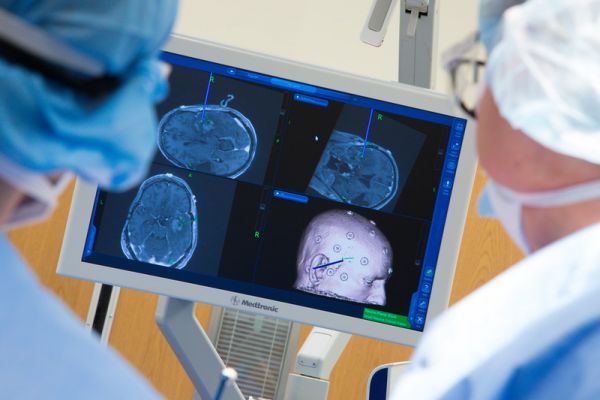Headaches are a very common ailment that most of the time are not a sign of something more serious. A lack of sleep, loud noise, brightness, even changing weather can cause a headache that, for the most part, can be cured with some rest or over-the-counter medicine. While this is true for the vast majority of headaches, they can sometimes be a symptom of a dangerous underlying problem like a brain tumor.
"Many patients with brain tumors do experience headaches, ranging from mild to severe and unremitting," says Lindsay Lipinski, MD, Assistant Professor of Oncology and a neurosurgeon at Roswell Park Comprehensive Cancer Center. "I estimate 50 to 60% of patients with brain tumors at Roswell Park experience headaches at the time of their diagnosis. They occur most often in conjunction with another neurologic problem, like a seizure or speech problem, that led to the diagnosis."
What do headaches caused by brain tumors feel like?
Every patient's pain experience is unique, but headaches associated with brain tumors tend to be constant and are worse at night or in the early morning. They are often described as dull, "pressure-type" headaches, though some patients also experience sharp or "stabbing" pain. They can be localized to a specific area or generalized. They can be made worse with coughing, sneezing or straining. A headache caused by a tumor may respond to over-the-counter medications early in treatment but may become more resistant to medication over time.
The brain itself does not have any pain receptors, but there are several mechanisms that explain why brain tumors cause headaches. The most basic is that a tumor can raise your intracranial pressure (pressure inside the skull) and cause stretching of the dura—the covering of the brain and spinal cord. This can be painful, because the dura has sensory nerve endings.
"The skull is basically a sphere with a set amount of tissue inside it. Adding more tissue (a tumor or blood clot, for example) raises the pressure inside the sphere because the skull cannot expand to accommodate it,” says Dr. Lipinski.
Also, tumors sometimes can occur in locations that block the normal flow of cerebrospinal fluid—the fluid created in the brain that coats and cushions the brain and spinal cord. “The increased fluid can also increase the intracranial pressure,” says Dr. Lipinski.
Some people also theorize that stretching of blood vessels by a tumor could be perceived as painful, says Dr. Lipinski, adding, “It also is possible that certain tumors release inflammatory proteins (cytokines) that may contribute to headache."
Are the tumors that cause headaches typically malignant or benign?
The pattern of headaches a patient experiences doesn't give doctors much information about the tumor it is associated with: Some patients with malignant tumors have no headaches at all, while smaller benign tumors can cause debilitating headaches, and vice versa. An evaluation by your doctor, in conjunction with imaging studies like a CT scan or MRI when necessary, will provide much more information.
Brain tumor signs & symptoms
There are other symptoms you may be experiencing if you suspect you have a brain tumor.
Learn moreHow long should someone wait until they see a doctor about their headache?
"Remember that the vast majority of headaches are self-resolving and not a symptom of a serious underlying health condition. However, you should contact your doctor if you have a new severe headache or a headache that is different from your normal pattern of headaches," says Dr. Lipinski. "For instance, headaches that are sudden and very severe ("thunderclap headache") are concerning and should be evaluated immediately. Headaches that wake you from sleep, are worse in the morning, progressively worsen and do not improve with over-the-counter medications, are worse with coughing or bending forward, or are associated with any other neurologic symptoms should prompt a visit to your doctor."
The same precautions should be taken by those who have a previous cancer diagnosis. If you are currently in treatment for or are a survivor of any cancer, and you have a new headache that is severe or persistent, you should speak with your cancer doctor right away.



